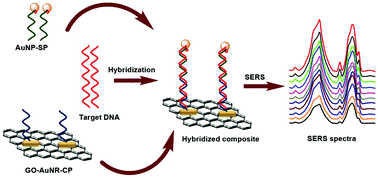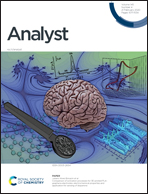Dual platform based sandwich assay surface-enhanced Raman scattering DNA biosensor for the sensitive detection of food adulteration†
Abstract
Surface enhanced Raman scattering (SERS) DNA biosensing is an ultrasensitive, selective, and rapid detection technique with the ability to produce molecule-specific distinct fingerprint spectra. It supersedes the long amplicon based PCR assays, the fluorescence and spectroscopic techniques with their quenching and narrow spectral bandwidth, and the electrochemical detection techniques using multiplexing. However, the performance of the SERS DNA biosensor relies on the DNA probe length, platform composition, both the presence and position of Raman tags and the chosen sensing strategy. In this context, we herein report a SERS biosensor based on dual nanoplatforms with a uniquely designed Raman tag (ATTO Rho6G) intercalated short-length DNA probe for the sensitive detection of the pig species Sus scrofa. In the design of the signal probe (SP), a Raman tag was incorporated adjacent to the spacer arm, followed by a terminal thiol modifier, which consequently had a strong influence on the SERS signal enhancement. The detection strategy involves the probe–target DNA hybridization mediated coupling of the two platforms, i.e., the graphene oxide-gold nanorod (GO-AuNR) functionalized capture probe (CP) and SP-conjugated gold nanoparticles (AuNPs), consequently enhancing the SERS intensity by both the electromagnetic hot spots generated at the junctions or interstices of the two platforms and the chemical enhancement between the AuNPs and the adsorbed intercalated Raman tag. This dual platform based SERS DNA biosensor exhibited outstanding sensitivity in detecting pork DNA with a limit of detection (LOD) of 100 aM validated with DNA extracted from a pork sample (LOD 1 fM). Moreover, the fabricated SERS biosensor showed outstanding selectivity and specificity for differentiating the DNA sequences of six closely related non-target species from the target DNA sequences with single and three nucleotide base-mismatches. Therefore, the developed short-length DNA linked dual platform based SERS biosensor could replace the less sensitive traditional methods of pork DNA detection and be adopted as a universal detection approach for the qualitative and quantitative detection of DNA from any source.



 Please wait while we load your content...
Please wait while we load your content...